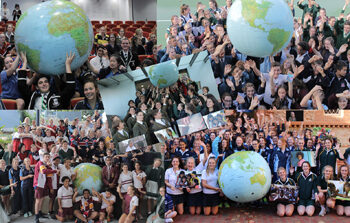ABM Archive Website
THIS WEBSITE CONTAINS ARCHIVE MATERIALS FOR HISTORICAL REFERENCE ONLY
For up-to-date information, including our latest appeals, news, and resources, please visit our current website.
Students learn about global issues at One World WonTok Conferences
June 1, 2014

One World WonTok is a development education conference initiative of the Anglican Board of Mission and UnitingWorld that has toured Australian capital cities in recent weeks. ABM and UnitingWorld would like to thank the schools in Sydney, Brisbane, Perth, Adelaide and Melbourne who participated in this event and for making it such a success!
Greg Henderson, ABM’s Eduction Officer, shares his account of the conference:
At this year’s conference students wrestled with challenging questions and scenarios as they engaged with global issues that broadened their understanding of the complexities of poverty and development.
The day began with a multimedia presentation inviting delegates to imagine the world as a single village. How many people would be lining up in the streets to use a single toilet? How many square kilometres would the cemetery be for children under the age of five who die from preventable diseases such as diarrhoea and pneumonia? What would this village look like as a concentrated form of the world today?
To illustrate the global village, students were challenged to find as many points of commonality with each other and with others around the world as possible. They soon discovered that what they shared in common extended far beyond the conference room – a 6 degrees of separation activity revealed this all too clearly. This session traced a $14 t-shirt through 6 steps (degrees) to its origins in the cotton field planted and harvested by [exploited child] workers. What has been found to be the average cost of labour per $14 t-shirt, you might ask? Twelve cents. We are connected to the world by something as simple as the clothes we wear, fair trade or otherwise.
After this session a Year 10 student from Perth remarked that he’d felt empowered to make more informed choices as a global citizen, saying, “It really opened my eyes and now I want to make a difference.”
A touch of friendly competition filled the air following the 6 degrees session as delegates were quizzed on their feet with United Nations statistics that focused largely on Australia’s closest neighbour, Papua New Guinea (PNG). There was hardly a better way to follow this quiz than to hear from two special guest speakers flown in for the conferences who shared of their experience living and working in PNG. Many students commented that one of their highlights of the day was hearing these stories from these two different yet complimentary perspectives.
ABM’s PNG Partner Liaison Officer Meagan Morrison introduced her inspiring story in PNG’s ‘Tok Pisin’ language then shared the key points in her journey that led her to where she is today. Meagan encouraged students to follow their dreams and to use their skills and talents to make a positive impact on the world. Kerren Vali, a PNG national working for UnitingWorld, shared of her teaching vocation that eventually led her to work with village communities to overcome poverty and other barriers to development. It was evident that Meagan and Kerren, two people from vastly different socio-cultural backgrounds, had far more in common than not!
Next, students were invited to step into ‘character’ as someone who lived in a PNG village. Each delegate was assigned a particular village character for the duration of the village simulation and had to work cooperatively with other village members to decide on the layout of their village and how they would respond to a range of scenarios such as a cholera outbreak and natural disaster. A ‘Government’ and ‘Non-government Organisation’ were able to assist and offer advice to villages upon request at various times throughout the simulation. The simulation “really gave a fresh perspective of what it’s like living in a village community,” said one student in Melbourne.
The conference wrapped up with a focus and discussions on the practical ways students can continue to be active global [village] citizens and agents of positive change in the world we live in. Both teachers and students found the afternoon session particularly helpful in generating ideas to take back to their own school. One teacher remarked, “I personally thought it was excellent… the guest speakers were excellent and gave first-hand accounts of what is actually happening in countries on our doorstep… I did a brainstorm session with the boys and we came up with [a whole list of ideas] as a result of the day.”
One World WonTok will be inviting schools to participate in conferences around the country in 2015.


